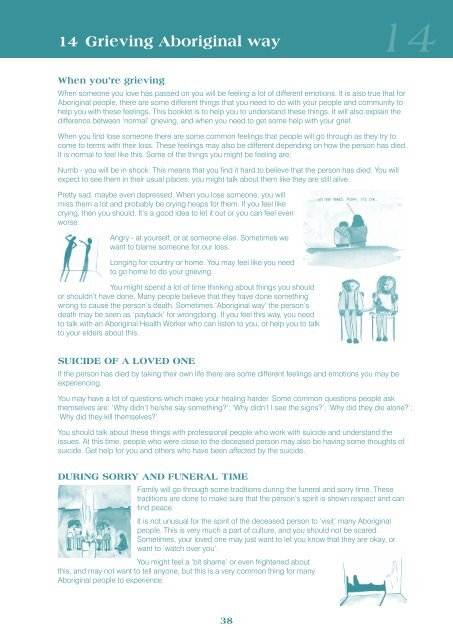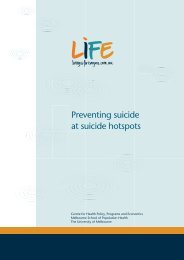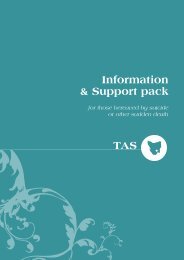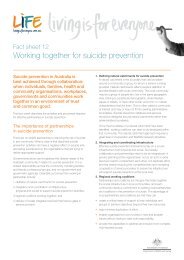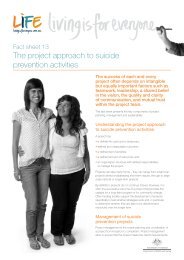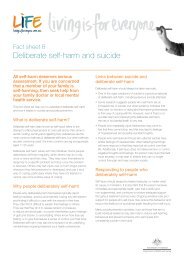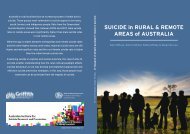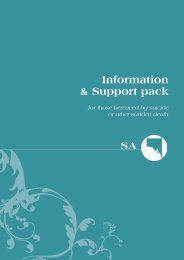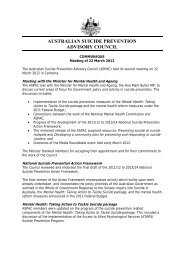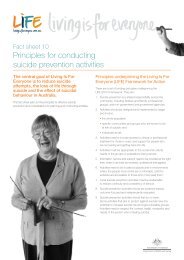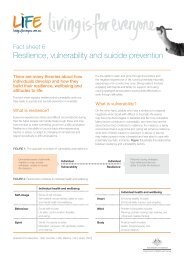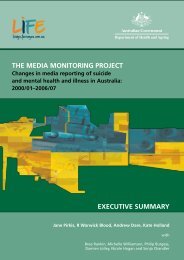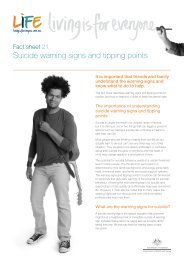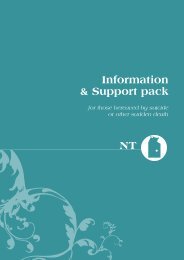Information & Support pack WA - Living is for Everyone
Information & Support pack WA - Living is for Everyone
Information & Support pack WA - Living is for Everyone
- No tags were found...
Create successful ePaper yourself
Turn your PDF publications into a flip-book with our unique Google optimized e-Paper software.
14 Grieving Aboriginal way14When you’re grievingWhen someone you love has passed on you will be feeling a lot of different emotions. It <strong>is</strong> also true that <strong>for</strong>Aboriginal people, there are some different things that you need to do with your people and community tohelp you with these feelings. Th<strong>is</strong> booklet <strong>is</strong> to help you to understand these things. It will also explain thedifference between ‘normal’ grieving, and when you need to get some help with your grief.When you first lose someone there are some common feelings that people will go through as they try tocome to terms with their loss. These feelings may also be different depending on how the person has died.It <strong>is</strong> normal to feel like th<strong>is</strong>. Some of the things you might be feeling are:Numb - you will be in shock. Th<strong>is</strong> means that you find it hard to believe that the person has died. You willexpect to see them in their usual places; you might talk about them like they are still alive.Pretty sad, maybe even depressed. When you lose someone, you willm<strong>is</strong>s them a lot and probably be crying heaps <strong>for</strong> them. If you feel likecrying, then you should. It’s a good idea to let it out or you can feel evenworse.Angry - at yourself, or at someone else. Sometimes wewant to blame someone <strong>for</strong> our loss.Longing <strong>for</strong> country or home. You may feel like you needto go home to do your grieving.You might spend a lot of time thinking about things you shouldor shouldn’t have done. Many people believe that they have done somethingwrong to cause the person’s death. Sometimes ‘Aboriginal way’ the person’sdeath may be seen as ‘payback’ <strong>for</strong> wrongdoing. If you feel th<strong>is</strong> way, you needto talk with an Aboriginal Health Worker who can l<strong>is</strong>ten to you, or help you to talkto your elders about th<strong>is</strong>.SUICIDE OF A LOVED ONEIf the person has died by taking their own life there are some different feelings and emotions you may beexperiencing.You may have a lot of questions which make your healing harder. Some common questions people askthemselves are: ‘Why didn’t he/she say something?’; ‘Why didn’t I see the signs?’; ‘Why did they die alone?’;‘Why did they kill themselves?’You should talk about these things with professional people who work with suicide and understand the<strong>is</strong>sues. At th<strong>is</strong> time, people who were close to the deceased person may also be having some thoughts ofsuicide. Get help <strong>for</strong> you and others who have been affected by the suicide.DURING SORRY AND FUNERAL TIMEFamily will go through some traditions during the funeral and sorry time. Thesetraditions are done to make sure that the person’s spirit <strong>is</strong> shown respect and canfind peace.It <strong>is</strong> not unusual <strong>for</strong> the spirit of the deceased person to ‘v<strong>is</strong>it’ many Aboriginalpeople. Th<strong>is</strong> <strong>is</strong> very much a part of culture, and you should not be scared.Sometimes, your loved one may just want to let you know that they are okay, orwant to ‘watch over you’.You might feel a ‘bit shame’ or even frightened aboutth<strong>is</strong>, and may not want to tell anyone, but th<strong>is</strong> <strong>is</strong> a very common thing <strong>for</strong> manyAboriginal people to experience.38


